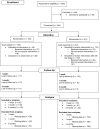An online behavioral self-help intervention rapidly improves acute insomnia severity and subjective mood during the coronavirus disease-2019 pandemic: a stratified randomized controlled trial
- PMID: 38430544
- PMCID: PMC11168762
- DOI: 10.1093/sleep/zsae059
An online behavioral self-help intervention rapidly improves acute insomnia severity and subjective mood during the coronavirus disease-2019 pandemic: a stratified randomized controlled trial
Abstract
Study objectives: Stressful life events, such as the coronavirus disease-2019 (COVID-19) pandemic, can cause acute insomnia. Cognitive behavioral therapy for acute insomnia is effective but is both time and resource-intensive. This study investigated if an online behavioral self-help intervention, which has been successfully used alongside sleep restriction for acute insomnia, reduced insomnia severity and improved mood in acute insomnia. This study also assessed good sleepers to explore if a "sleep vaccination" approach was feasible.
Methods: In this online stratified randomized controlled trial, 344 participants (103 good sleepers and 241 participants with DSM-5 acute insomnia) were randomized to receive the intervention/no intervention (good sleepers) or intervention/intervention after 28 days (poor sleepers). Insomnia severity was assessed using the ISI (primary outcome), and anxiety and depression using the GAD-7/PHQ-9 (secondary outcomes) at baseline, 1 week, 1 month, and 3-month follow-up.
Results: In people with acute insomnia, relative to baseline, there were significant reductions in ISI (dz = 1.17), GAD-7 (dz = 0.70), and PHQ-9 (dz = 0.60) scores at 1-week follow-up. ISI, GAD-7, and PHQ-9 scores were significantly lower at all follow-up time points, relative to baseline. Subjective diary-derived sleep continuity was unaffected. No beneficial effects on sleep or mood were observed in good sleepers.
Conclusions: An online behavioral self-help intervention rapidly reduces acute insomnia severity (within 1 week), and benefits mood in people with acute insomnia. These beneficial effects are maintained up to 3 months later. Although the use of the intervention is feasible in good sleepers, their subjective sleep was unaffected.
Clinical trial registration: Testing an early online intervention for the treatment of disturbed sleep during the COVID-19 pandemic; prospectively registered at ISRCTN on 8 April 2020 (identifier: ISRCTN43900695).
Keywords: COVID-19; clinical trials research; insomnia; online intervention; stress.
© The Author(s) 2024. Published by Oxford University Press on behalf of Sleep Research Society.
Figures
Comment in
-
Insomnia gone in one week, without medication: too good to be true?Sleep. 2024 Jun 13;47(6):zsae092. doi: 10.1093/sleep/zsae092. Sleep. 2024. PMID: 38597884 Free PMC article. No abstract available.
Similar articles
-
Pramipexole in addition to mood stabilisers for treatment-resistant bipolar depression: the PAX-BD randomised double-blind placebo-controlled trial.Health Technol Assess. 2025 May;29(21):1-216. doi: 10.3310/HBFC1953. Health Technol Assess. 2025. PMID: 40455248 Free PMC article. Clinical Trial.
-
Health-related quality of life and mental health outcomes among cancer survivors in an insomnia intervention: a randomized controlled trial.Ann Behav Med. 2025 Jan 4;59(1):kaae096. doi: 10.1093/abm/kaae096. Ann Behav Med. 2025. PMID: 39887070 Clinical Trial.
-
Digital cognitive behavioural therapy for insomnia versus digital sleep education control in an Australian community-based sample: a randomised controlled trial.Intern Med J. 2024 Nov;54(11):1838-1848. doi: 10.1111/imj.16521. Epub 2024 Sep 11. Intern Med J. 2024. PMID: 39257295 Clinical Trial.
-
Psychological therapies (remotely delivered) for the management of chronic and recurrent pain in children and adolescents.Cochrane Database Syst Rev. 2015 Mar 23;3(3):CD011118. doi: 10.1002/14651858.CD011118.pub2. Cochrane Database Syst Rev. 2015. Update in: Cochrane Database Syst Rev. 2019 Apr 02;4:CD011118. doi: 10.1002/14651858.CD011118.pub3. PMID: 25803793 Free PMC article. Updated.
-
Reminiscence therapy for dementia.Cochrane Database Syst Rev. 2018 Mar 1;3(3):CD001120. doi: 10.1002/14651858.CD001120.pub3. Cochrane Database Syst Rev. 2018. PMID: 29493789 Free PMC article.
Cited by
-
Dietary interventions to support and improve sleep disturbances and insomnia disorder in menopause: From bench to bedside.Post Reprod Health. 2025 Jun;31(2):122-126. doi: 10.1177/20533691251350518. Epub 2025 Jul 2. Post Reprod Health. 2025. PMID: 40605196 Free PMC article. Review.
-
Insomnia gone in one week, without medication: too good to be true?Sleep. 2024 Jun 13;47(6):zsae092. doi: 10.1093/sleep/zsae092. Sleep. 2024. PMID: 38597884 Free PMC article. No abstract available.
References
Publication types
MeSH terms
Associated data
LinkOut - more resources
Full Text Sources
Medical
Miscellaneous




